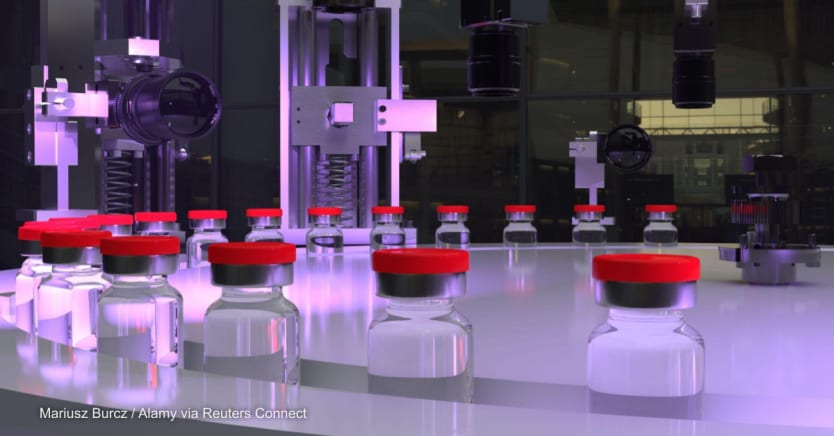
Born out of the inequities in access to COVID-19 vaccines, the mRNA technology transfer hub in Cape Town, South Africa, is aiming to unlock commercial production of a COVID-19 vaccine in the next 18 months and transfer that knowledge to 15 partner facilities distributed across the global south. Depending on the market for the product, though, those technology recipients — known as “spokes” — may ultimately bypass COVID-19 vaccine production entirely and use the knowledge they’re receiving from the hub to produce mRNA-based vaccines for other diseases.
The mRNA hub was launched by the World Health Organization in July 2021, with an ambitious goal of developing and transferring technology and knowledge for mRNA vaccine development between a network of facilities in low- and middle-income countries. While the COVID-19 vaccine is a crucial test for the hub and a potential first step to unlocking research and development capacity for other mRNA vaccines, it may not be the goal for all the spokes.
Though they are linked and committed to sharing knowledge, each spoke can ultimately plot its own path forward, Martin Friede, the coordinator for the Initiative for Vaccine Research at WHO, told Devex.
“Some will say, ‘Give us the technology and we will use it for other stuff,’” he said. “Some of them might say, ‘We want to make a COVID vaccine.’”
Those deviations are already happening. Sinergium Biotech and Bio-Manguinhos, the two South American spokes, are considering what other vaccines they might develop, even before a possible COVID-19 jab.
“It might make more sense to shift to another antigen or another disease, which is something we are working on in collaboration with the WHO,” Fernando Lobos, the business development director at Sinergium told Devex. “We’re trying to identify what are the needs of our region and what makes the most sense.”
For many of the spokes, manufacturing any product at all will depend on overcoming additional hurdles, though, including identifying a workforce, constructing facilities, and sorting out intellectual property and regulatory issues.
An emerging network
Afrigen is at the center of the hub-and-spoke model tasked with developing an mRNA COVID-19 vaccine. Using publicly available information about Moderna’s existing vaccine — but without any cooperation from the company — Afrigen had a formula ready by February.
Even as the company works to scale up its own facilities, it has already begun transferring knowledge to the spokes, six of which are in Africa, five in Asia and the rest in South America and eastern Europe.
“We bring the spokes here, they come to the African facilities, they work in the labs and they learn how to make mRNA,” Petro Terblanche, Afrigen’s managing director, told Devex. Representatives from 11 of the spokes will have visited the Afrigen laboratories before the end of the year, she said.
Afrigen still has to achieve two additional milestones beyond validating the mRNA process: showing that it can scale up the quantities of vaccine it produces and — in partnership with Biovac, a larger pharmaceutical company in Cape Town — producing the shots on a commercial scale. They will then have to put together technology packages that will enable the spokes to copy their work. These are not just formulations for the vaccines, but also details on standard operating procedures, information on quality control and assurance, and all of the analytical information.
Moderna’s patents stand in way of mRNA vaccine hub’s grand vision
The world’s first mRNA vaccine "technology transfer hub" in South Africa aims to help reshape pandemic preparedness in lower-income countries. But its leadership says Moderna's patents stand in the way of what the hub is working toward.
“It’s massive, really multilayered packages,” Terblanche said. She currently estimates the first scale-up will be ready to go out in 12 months to any of the spokes that are ready for it, and the second, commercial package, six months later. She acknowledges there might not be high demand for the COVID-19 vaccine by then, but said the process is critical as a proof of concept both for Afrigen and Biovac that they have the ability to produce a safe, effective mRNA vaccine, while simultaneously helping to build the capacity of the spokes.
Seizing the opportunity
Some members of the network are itching to push even further ahead. Sinergium, the Argentine spoke, sent a team to visit Afrigen in March and was able to replicate the South African manufacturer’s vaccine production in a laboratory setting within weeks, according to Lobos.
“Little by little, we are getting more movement,” he told Devex. “That’s the great thing about this program.”
Despite their progress, significant hurdles remain before Sinergium is producing mRNA vaccines at a commercial scale. The company is still trying to sort out the thicket of intellectual property, or IP, restrictions that govern what products they are able to use to produce a vaccine.
“There is a huge impetus to do something, which is great. But the complexities of doing it are something else, and not something we can just put together in a couple of months.”
— Charles Gore, executive director, Medicines Patent PoolThat is a potential challenge for all of the manufacturers. While Moderna has pledged not to enforce its patents when it comes to COVID-19 vaccines, it has not made the same commitment if that technology is used to develop other immunizations. That may eventually require Afrigen to pursue a different formula that “minimizes the risk of IP becoming a barrier when we go forward,” Friede said.
The list of challenges is even longer for other hubs. The spokes in Nigeria and Kenya do not even have facilities. Some producers also need assistance developing clinical trial capabilities to prove the efficacy and safety of their products. Many of their countries still need to develop their national regulatory capacity, so regulators are in a position to approve what they produce. And they will all need to ensure they have a market for any product they ultimately manufacture.
Some spokes are also trying to find funds to actually build the infrastructure to produce the vaccines and the workforce to help them do it.
Help is arriving. The Medicines Patent Pool has a team committed to sorting out the various domestic IP restrictions. Lobos said the NGO PATH is offering technical knowledge on clinical trials. And Afrigen is encouraging the manufacturers to include domestic regulatory officials in the teams that come to visit the Cape Town offices, so that they can learn about mRNA vaccine production alongside the scientists.
Terblanche, meanwhile, is on a mission to convince major international vaccine buyers, like Gavi, the Vaccine Alliance and UNICEF, to “just diversify your procurement. For now we’re not asking to change the system for supply of vaccines, just buy them from low- and middle-income manufacturers that meet the quality standard.”
For its part, Gavi has already announced plans to adopt a new approach to regional manufacturing, with a focus on increasing procurement from African manufacturers.
Then there is the question of funding. Lobos said that WHO is facilitating discussions with potential donors, like the Bill & Melinda Gates Foundation or the Coalition for Epidemic Preparedness Innovations, though nothing has been committed. Because some of the spokes are public companies or public-private hybrids, there is also pressure on their governments to commit money to the project, which might also compel officials to agree to purchase the vaccines that the spokes ultimately produce.
At the moment, Friede said, they are also encouraging governments to make relatively limited investments of around $15 million that will build a facility that can produce mRNA vaccines on a small scale — at least until the spokes are actually on track to manufacture and sell an approved vaccine.
A bigger vision
Those looming challenges have not stopped the spokes or policymakers from envisioning an even bolder future for this nascent network of pharmaceutical manufacturers. That includes leaders of some Group of 20 major economies who are looking “to go further than mRNA vaccines,” said Charles Gore, the executive director of the Medicines Patent Pool, a partner in developing the mRNA hub. “They want to set up [a research & development] and manufacturing network for health products across the board.”
Potentially layered onto the hub-and-spoke model, it would prioritize global south-south collaboration extending beyond mRNA vaccines.
Such a move would require significant funding, though, which has not been committed, and a strategy for what kind of products the network would focus on, including considerations like whether it wants to attempt to compete with multinational pharmaceutical companies. The easier route, Gore suggested, might be for researchers in the global south to prioritize diseases that are currently ignored by the pharmaceutical industry — such as a more effective malaria vaccine.
“This idea of empowering low- and middle-income countries to provide more health security, more control over where their health products come from has been put into really sharp relief by the vaccine situation with COVID,” he said.
“There is a huge impetus to do something, which is great. But the complexities of doing it are something else, and not something we can just put together in a couple of months.”



